In this fun training, you will learn some important qualities that Montessori Sensorial materials must have.
As an educator, a homeschool mother and a Montessori coach, I am continually inspired by Dr. Maria Montessori’s insight, especially with sensorial materials.
She inspires me into paying attention to and tending to the education of the young child’s five physical senses.
This is done through activities in her subject called Montessori Sensorial.
This is a unique and incomparable aspect of her method. I continue to be exploring and educating others on because it is so important.
No other educational method or philosophy focuses on sensorial or sensory education like The Montessori Method does.
“The senses, being explorers of the world, open the way to knowledge. Our apparatus for educating the senses offers the child a key to guide his explorations of the world…”
Montessori, M. (1988). The Absorbent Mind. Oxford: Clio Press. p. 167
In this training, I am going to be discussing three qualities that Montessori Sensorial materials and lessons must have.
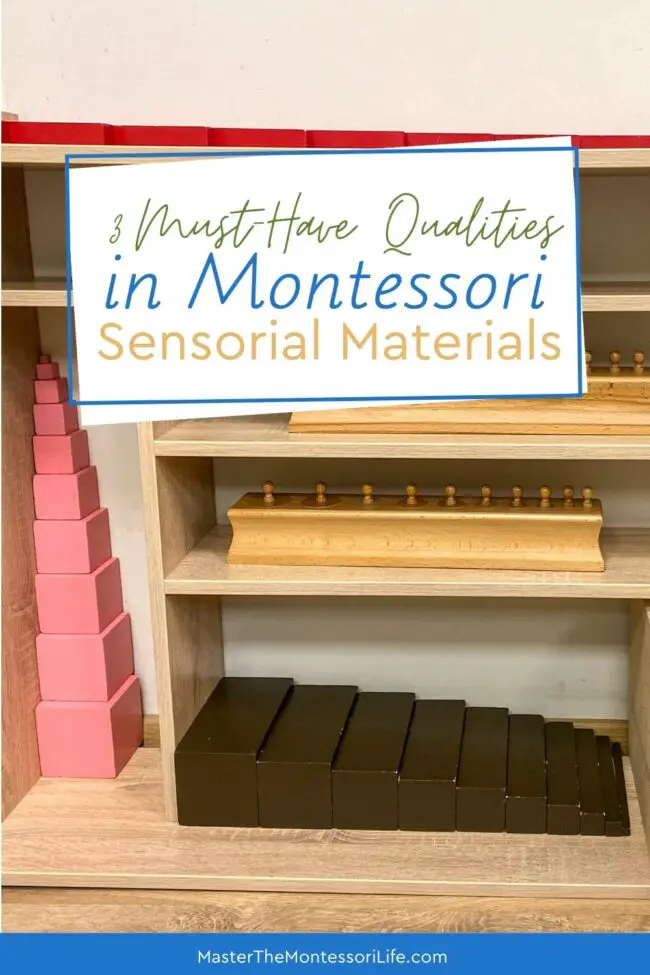
Watch & Listen to the Episode Here:
As you watch or listen to this training, know that you will be able to get more information than what is included in this blog post.
However, I really want to encourage you to take the time to watch or listen and take notes.
Importantly, this will be helpful to you now and in the future.
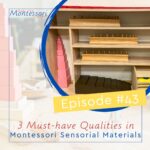
#1 Notice the 5 Senses
Montessori identified a time in a young child’s life in which it is acutely sensitive to the notions, experiences and impressions received through their senses.
These very important open windows of opportunity is what she called the “sensitive period.”
It is the sensations obtained through the five senses…
These are the senses of taste, touch, sight, smell, and hearing. They create and shape a child’s knowledge of his or her environmental world in a physical way. It also connects to other aspects, such as psychological and social.
“Education should no longer be mostly imparting of knowledge, but must take a new path, seeking the release of human potentialities.”
Dr. Maria Montessori
The wonderful Montessori Sensorial materials are to be present in all Montessori environments.
And they are presented to children in the way that Maria Montessori saw best by studying her writings in detail.
Using the Montessori Sensorial materials in your Montessori environment, you isolate certain aspects of the stimuli. Additionally, you create a sensory perception of them for the child.
It is the connections that children make as they study the content and build their own knowledge that sets this method of education apart from all others after the original presentation.
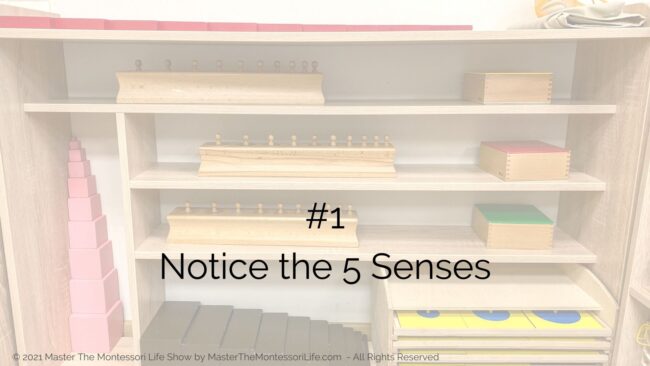
#2 Experience the 5 Senses
One of the most distinguishing characteristics of the Montessori environment is the emphasis focused on assisting the child in his or her pursuit of independence.
Freedom is a term that is often used to define or identify the ‘Montessori’ method of teaching.
It is common to hear about a child being given the freedom to choose. And the fact that they may and should select anything they want within the Montessori environment.
“The environment must be rich in motives which lend interest to activity and invite the child to conduct his own experiences.”
Dr. Montessori
This quotation helps to put freedom into perspective.
There is no doubt that there is freedom in Montessori settings.
Students possess complete freedom to select their own work and to roam about.
Remember that in order to be successful in gaining independence, a child should have the freedom to explore. Additionally, they choose his or her works and also have freedom of movement.
This allows for the child to explore and experience the five senses within the safe confines of the prepared environment.
As I always say, in Montessori, we control the environment, not the child.
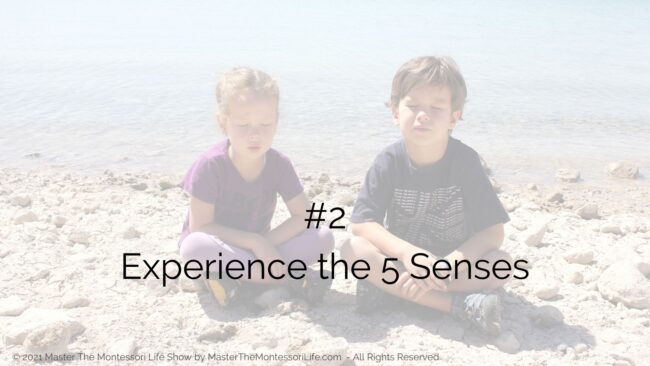
#3 Categorize the 5 Senses
Dr. Maria Montessori, the mastermind behind The Montessori Philosophy of education, saw the development of a child as a whole process that everyone values and respects.
The conventional ‘transfer’ of certain predetermined abilities and perhaps information did not apply to her schooling in any way.
I am referring to traditional schools, where the teacher is the center of attention and all knowledge comes from the adult in the room.
As an alternative, she urged Montessori Guides (the teachers) to focus on the child’s potential and interests, and to build on them.
“We shall walk together on this path of life, for all things are part of the universe and are connected with each other to form one whole unity.”
Maria Montessori
Implement a child-centered approach.
As a result, Montessori philosophy fosters a lifelong love of learning, as well as a sense of wonder and a profound respect for the environment in which we live.
Through the Montessori prepared environment and trained Montessori Guides, children may realize their own potential, rather than through hearing about it from others.
Challenge every child and give them with chances to develop qualities such as flexibility, creativity, connections, relationship and categorization, among other things.
As they categorize through analysis, children acquire working theories, the ability to problem solve, and a sense of the world around them as a result of experimenting with a variety of learning materials and activities, which they try out for themselves.
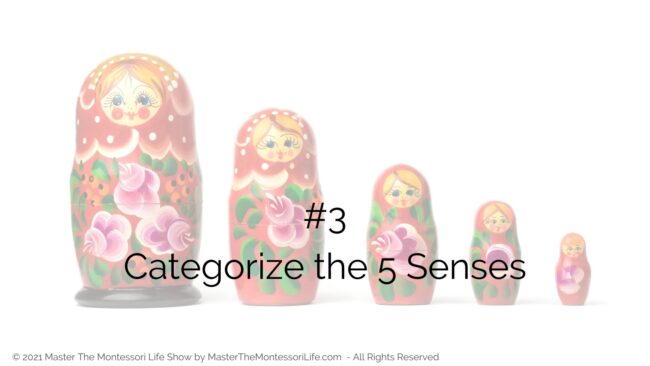
Key Takeaways
Sensorial activities are those that target the five sense to make sense of the world around them.
This includes visual discrimination through sensorial experience in the Montessori classroom.
As they grow, the child is developing a more refined idea on how much their sense of touch, sight, hearing, smell and taste can do for their understanding of the world around them.
Set up a Sensorial area on the shelves in your Montessori classroom.
You can combine some Sensorial works with Practical Life.
Resources mentioned in training
Like I said at the beginning of the show, I have a FB group for all things Montessori that you are welcome to join.
It is The Montessori Way Prep Room.
If you want to join a homeschool Facebook community, then join The Natural Homeschool Community!
Some Montessori Sensorial materials are:
- Red Rods
- Cylinder Blocks
- Pink Tower
- Brown Stair
You May Also Benefit from these Important Montessori Topics:
As you learn more about Master The Montessori Life, you will realize just how much I strive to make your life easier.
I also seek to equip you, to inform you and to give you made-for-you options so you can keep moving forward on your Montessori journey without any speed bumps.
- Hands-On Fun: 3 Montessori Practical Life Activities for Fall
 These simple Montessori Practical Life activities for Fall are easy to do anytime you have the materials ready.
These simple Montessori Practical Life activities for Fall are easy to do anytime you have the materials ready. - Embracing Autumn: A Montessori Guide to Fall Fun
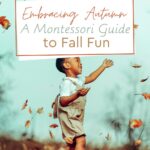 Spread the love The arrival of autumn brings a special kind of magic. The air turns crisp and leaves paint…
Spread the love The arrival of autumn brings a special kind of magic. The air turns crisp and leaves paint… - Montessori Toddler Essentials
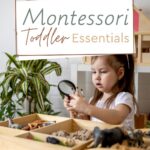 The Montessori method offers a pathway with a series of Montessori toddler essentials that you will find helpful.
The Montessori method offers a pathway with a series of Montessori toddler essentials that you will find helpful. - Motor Skills for Hands the Montessori Way
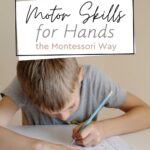 The Montessori Method puts a special focus on developing motor skills for hands, recognizing how essential they are for independence, confidence, and curiosity.
The Montessori Method puts a special focus on developing motor skills for hands, recognizing how essential they are for independence, confidence, and curiosity. - Simplify Toy Rotation with Montessori Checklist
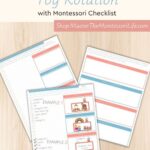 Make Toy Rotation Simple and Fun with the Montessori Toy Rotation Checklist Labels and Chart. Organizing your child’s play area shouldn’t be stressful! That’s why the Montessori Toy Rotation Checklist, Labels & Chart is every parent’s new best friend when it comes to keeping toys fresh and shelves inviting.
Make Toy Rotation Simple and Fun with the Montessori Toy Rotation Checklist Labels and Chart. Organizing your child’s play area shouldn’t be stressful! That’s why the Montessori Toy Rotation Checklist, Labels & Chart is every parent’s new best friend when it comes to keeping toys fresh and shelves inviting. - Sight Words for Toddlers in Montessori Language Arts
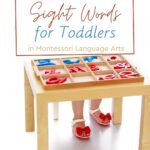 When you look into Montessori Language Arts, you will find a unique and engaging approach that helps toddlers master these important words.
When you look into Montessori Language Arts, you will find a unique and engaging approach that helps toddlers master these important words.

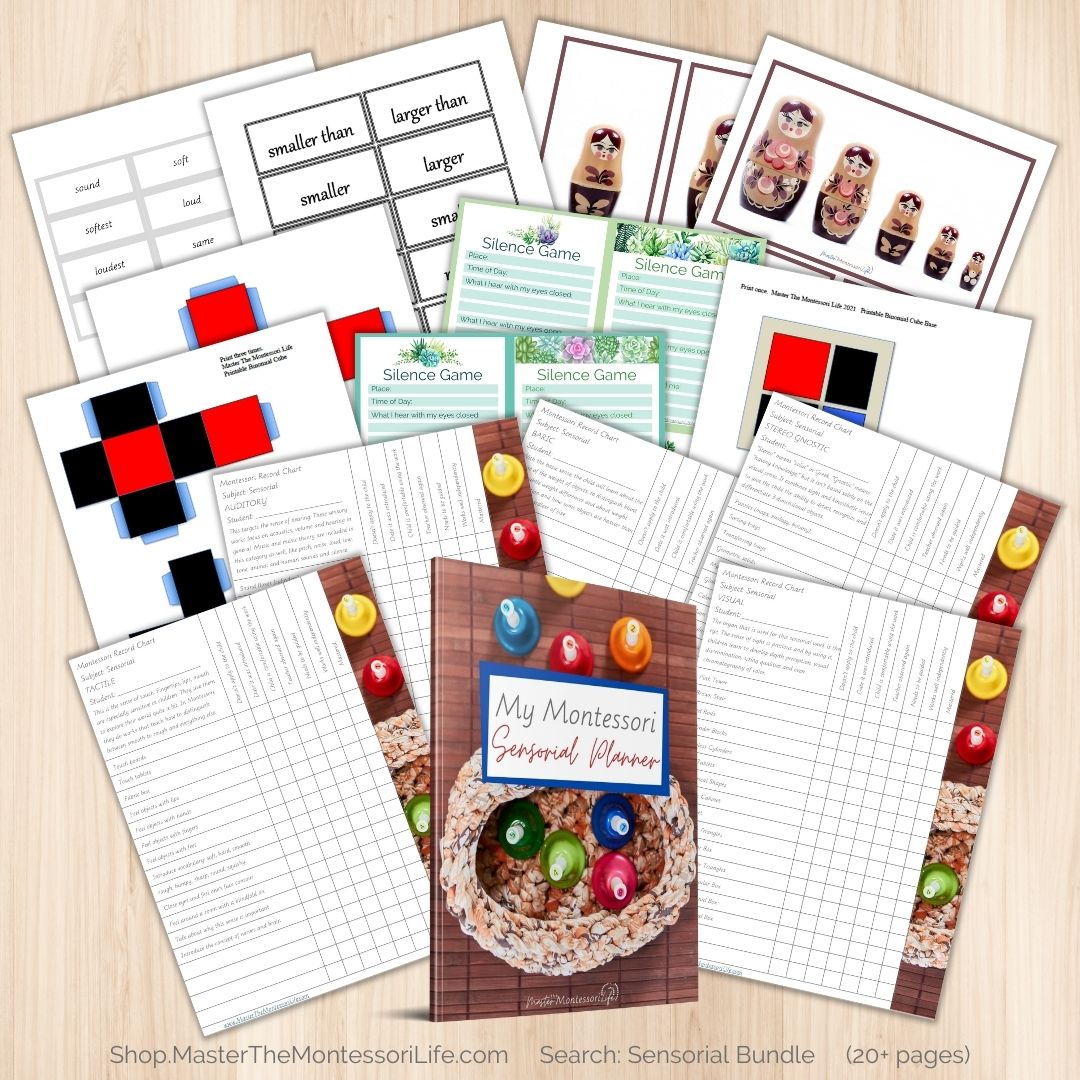
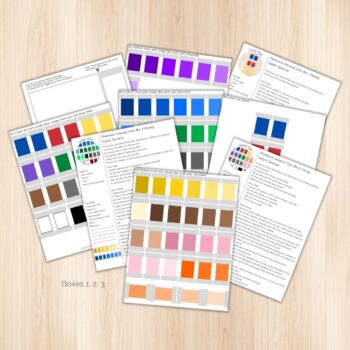
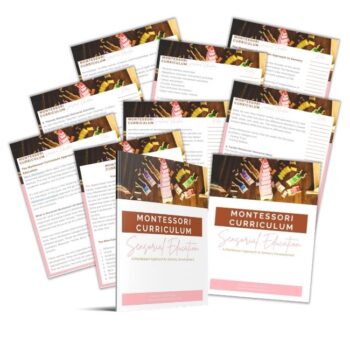
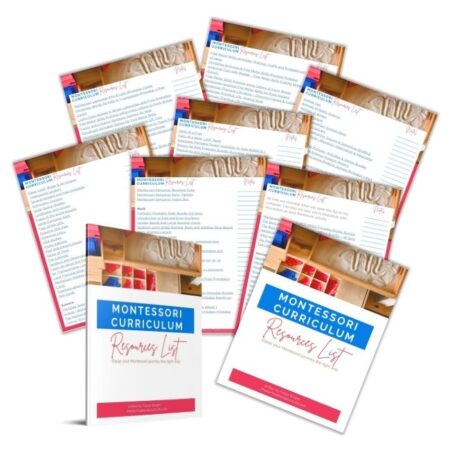
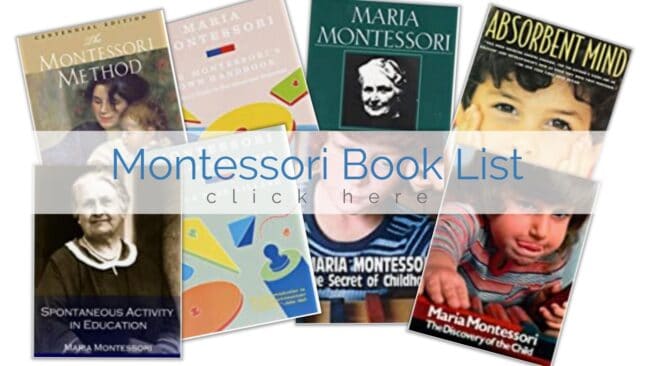

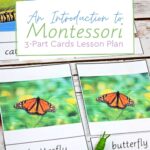
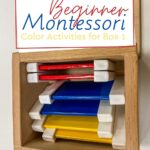
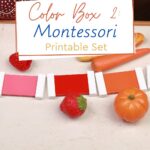
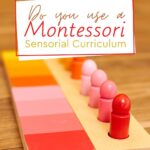
Leave a Reply